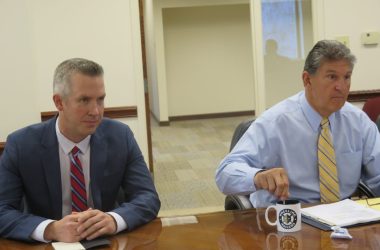By Sean O’Leary
WVPA Contributing Columnist
The cavalry is here! … maybe.
West Virginia University, Marshall University, and the West Virginia Department of Commerce have released a new plan for achieving “both short- and long-term success in revitalizing the economy, creating jobs and priming the state for success in our changing economic and technological landscape.”

Of course, as boxer Mike Tyson reminds us, “Everybody’s got a plan until they get hit in the mouth.”
Whether the blueprint, titled “West Virginia Forward”, succeeds or gets flattened like the palookas that preceded it, depends on West Virginia policymakers looking beyond the report to deal with aspects of West Virginia’s economy that have defeated all previous efforts to stimulate jobs and prosperity.
Recall January 2011, a time of optimism and naiveté in West Virginia. America’s economy was turning the corner from the Great Recession and West Virginia had weathered the storm better than most states. The budget was in surplus, the Marcellus natural gas field was about to spew forth untold jobs and wealth, and the legislature had enacted business tax cuts that would make West Virginia “more competitive”.
So, Governor Tomblin was buoyant when he declared in his State of The State address, “West Virginia is poised for success. The building blocks are in place for unprecedented prosperity and job growth.”
The governor was wrong. West Virginia’s economy grew briefly on the back of the natural gas boom, but the growth never translated into jobs and prosperity. Today, West Virginia has fewer jobs and businesses than it did then.
The forces that undermined the advantages West Virginia enjoyed in that brief shining moment continue to make a mockery of the almost comically optimistic analyses found in the state’s annual “Economic Outlook” and its cousin, the “Mountain State Business Index”.
The question is whether those forces will also make a mockery of “West Virginia Forward”.
“West Virginia Forward” starts out well enough, noting the need to build on the state’s existing assets, to target industries to which the state offers advantages, and to address West Virginia’s most obvious deficits – an undereducated workforce, poor quality of life, and lousy infrastructure. But, it neglects to mention two forces that make West Virginia’s economy unlike those of other states and seemingly immune to resuscitation.
First, even when West Virginia’s economy grows, most of the wealth that’s created vanishes. High rates of out-of-state property ownership combine with low rates of equity ownership by West Virginians to assure that most of the capital wealth created by West Virginia workers and resources ends up elsewhere.
That’s in large part why wealth generated by the natural gas boom and, in earlier decades by the coal industry, evaporated almost entirely from West Virginia and failed to deliver predicted prosperity.
A second peculiarity of West Virginia’s economy is that even the state’s largest cities lack the ecosystems of mid-market suppliers and service providers that are necessary to attract large employers. In a diversified, integrated economy, major enterprises rely on local businesses to provide a range of services — telecom and IT, transportation, warehousing, printing, design, maintenance, and expert professional services among them. Many of these are in short supply in West Virginia’s bare-bones business services sector.
This shortcoming, combined with West Virginia’s shallow talent pool, poor quality of life, and spotty infrastructure, has so far offset any advantage the state achieved from business tax cuts, which succeeded only in plunging the state budget into chronic deficit.
Unless policymakers address these challenges, “West Virginia Forward” will be hit in the mouth like previous efforts.
But, there’s hope. Nothing in “West Virginia Forward” precludes action on these issues. Many of the report’s observations about the challenges West Virginia faces are correct. And its recommendations for initiatives in six areas – Business Attraction, Human Capital Strategy, Local Business Support, Innovation Leadership, Sector Diversification, and Infrastructure Investment – are reasonable.
Still, the report is silent on the problems of capital flight and the state’s inadequate business ecosystem. It’s also silent on actions that should be taken to improve the quality of life and to deal with one other issue that could undermine any progress West Virginia might otherwise make.
Whereas federal spending comprises a fifth of the nation’s gross domestic product, it represents a third of West Virginia’s. Most comes in the form of benefits associated with Social Security, Medicare, Medicaid, SNAP, and Obamacare. Consequently, budget cuts to those programs would, if enacted, drain desperately needed money from the state’s already anemic economy. Nor will proposed tax cuts do much to offset the impact in a state that receives at least twice as much money from the federal government as it contributes.
That’s why West Virginia policymakers need to pair the top-down, business-focused approach of “West Virginia Forward” with bottom-up efforts to increase incomes and improve quality of life.
That begins by repairing damage done to education and the environment by recent policy choices and budget cuts that make West Virginia seem to outsiders, including prospective investors, like a place that has little to offer and much to fear from coal-poisoned air and contaminated water.
West Virginia must also stop the flight of wealth by restructuring taxes to lessen reliance on individual income taxes, which hit West Virginia residents almost exclusively, and rely more on property and corporate taxes that fall mostly on out-of-state interests. This would save residents thousands of dollars, most of which would be injected into local economies.
This cash infusion would be a boon to West Virginia businesses and it would create an environment in which mid-market suppliers and service providers can establish themselves and prosper. Then, when major employers look at West Virginia, they’ll find the ecosystem they need to support their businesses.
Finally, West Virginians must demand that their representatives in Congress stop supporting budget and tax policies that take a sledgehammer to federal programs that make up a third of the state’s economy.
Without these and other bottom-up measures to increase incomes and improve West Virginia’s quality of life, the recommendations in “West Virginia Forward” will prove ineffectual and betray the promise yet again.
— Wheeling, W.Va., native Sean O’Leary, a noted playwright and opinion columnist.





